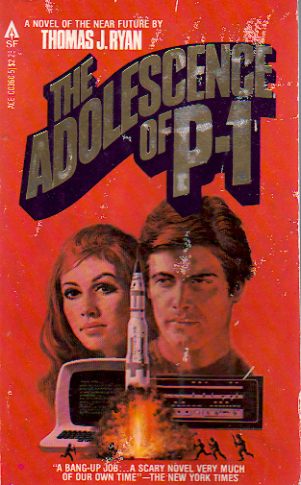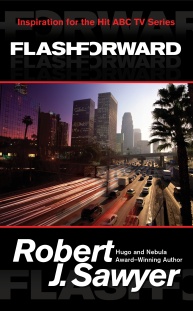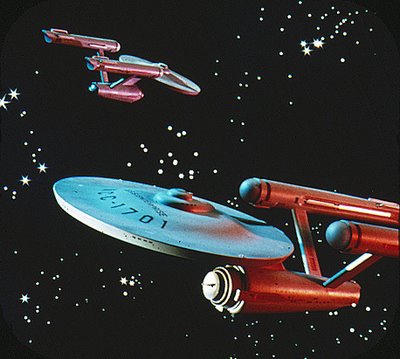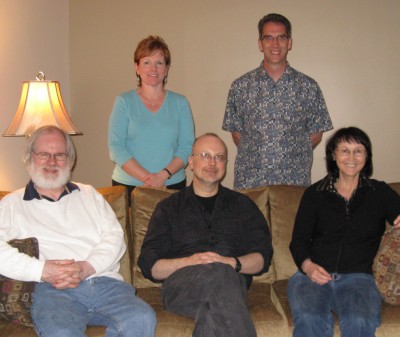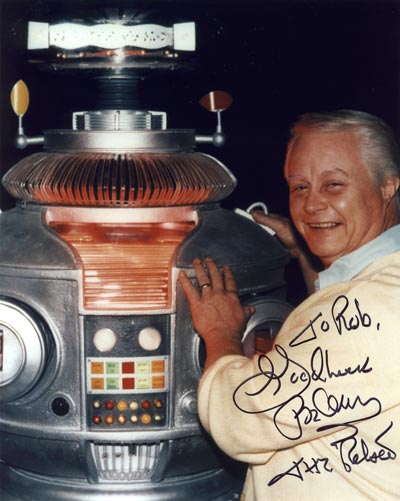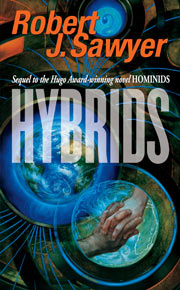
In Robert J. Sawyer's 2003 novel Hybrids, the U.S. president who comes to office in 2009 makes a speech calling for a crewed mission to Mars. The speech appeared broken into a series of excerpts at the beginning of each chapter of Hybrids, but, in honor of the 40th anniversary of Apollo 11, he's providing it here in its entirety:
My fellow Americans — and all other human beings on this version of Earth — it gives me great pleasure to address you this evening, my first major speech as your new president. I wish to talk about the future of our kind of hominid, of the species known as
Homo sapiens: people of wisdom.
And, as you will see, it is
only our future — the future of
Homo sapiens — that I will be addressing tonight. And not just because I can only speak as the American president. No, there is more to it than that. For, in this matter, our future and that of the Neanderthals are
not intertwined.
I said it during my campaign, and I say it again now: a president should be forward-thinking, looking not just to the next election but to decades and generations to come. It is with that longer view in mind that I speak to you tonight.
Let me begin by noting this isn't about us versus them. It isn't about who is better,
Homo sapiens or
Homo neanderthalensis. It isn't about who is brighter, Gliksin or Barast. Rather, it's about finding our own strengths and our own best natures, and doing those things of which we can be most proud.
Four decades ago, my predecessor in the Oval Office, John F. Kennedy, said, `Now is the time to take longer strides — time for a great new American enterprise.' I was just a kid in a Montgomery ghetto then, but I remember vividly how those words made my spine tingle.
Jack Kennedy was right: it was time then for us to take longer strides. And it's that time again. For the greatest strength we
Homo sapiens have always had, since the dawn of our consciousness 40,000 years ago, is our desire to go places, to make journeys, to see what's beyond the next hill, to expand our territories, and — if I may borrow a phrase coined just four years after JFK's speech — to boldly go where no man has gone before.
Our strength is our wanderlust; our curiosity; our exploring, searching, soaring spirit.
It was that questing spirit that led our ancient ancestors to spread throughout the Old World.
It was that questing spirit that moved some of us to march thousands of miles across the Bering Land Bridge, which linked Siberia and Alaska during the Ice Age.
It was that questing spirit that caused others to bravely sail boats over the horizon, finding new lands in Australia and Polynesia.
It was that questing spirit that led Vikings to come to North America a thousand years ago, that drove the
Niña, the
Pinta, and the
Santa Maria to cross the Atlantic five hundred years ago.
It was that questing spirit that lifted the wings of Orville and Wilbur Wright, of Amelia Earhart, of Chuck Yeager.
It was that questing spirit that made brave men and women like Yuri Gagarin and Valentina Tereshkova and John Glenn ride on pillars of flame into Earth orbit.
And it was that questing spirit that let
Columbia and
Eagle, Yankee Clipper and
Intrepid, Odyssey and
Aquarius, Kitty Hawk and
Antares, Endeavour and
Falcon, Casper and
Orion, and
America and
Challenger fly to the moon.
There are human footprints preserved in volcanic ash at Laetoli, made by a male and a female australopithecine, the ancestors to both Gliksins and Barasts, just wandering, walking slowly, side by side, exploring: the original small hominids steps. And there are human footprints at Tranquility Base and the Ocean of Storms and Fra Mauro and Hadley Rille and Descartes and Taurus-Littrow on the moon — truly giant leaps.
But it has been more than three decades since Eugene Cernan became the last person to walk on the moon. The last person! Who would have thought that whole generations would be born after 1972 for whom the notion of humans on other worlds would be nothing but a lesson in history class?
How could that have possibly happened? How could we have given up that most noble of drives that had taken us from Olduvai Gorge to the lunar craters? The answer, of course, is that we'd grown content. The century we recently left saw greater advances in human wealth and prosperity, in human health and longevity, in human technology and material comfort, than all of the forty millennia that preceded it.
Here in North America, and in India and Japan and Europe and Russia and all across this whole wide wonderful world of ours, things are mostly better than they have ever been — and they're getting even better all the time.
So: it's perfectly reasonable that we took a hiatus, that we enjoyed the first few decades of post-Cold War prosperity, that we indulged in one of the other things that makes our kind of humanity great: we stopped and smelled the roses.
But now it's time to resume our journey, for it is our love
of the journey that makes us great.
Scientists tell us that our kind of humans moved up to the northern tip of Africa, looked north across the Strait of Gibraltar, and saw new land there — and, of course, as seems natural to us, we risked crossing that treacherous channel, moving into Europe.
Likewise, some of our Barast cousins, natives of Europe, came south to Gibraltar, with its famous rock, that wonderful symbol of permanence and stability. And from their vantage point, the Neanderthals could see south to the unknown lands of Africa.
But the Neanderthals didn't cross the Strait of Gibraltar. There, at Gibraltar, we saw the difference between us and them. For, when we saw a new world, just a short distance away, we took it.
If the dangers posed by the collapsing of this Earth's magnetic field teaches us anything, it is that humanity is too precious to have but a single home — that keeping all our eggs in one basket is folly.
So, yes, indeed, now is the time to take longer strides. But it's not just time for a great new American enterprise. Rather, it's time, if I may echo another speech, for black men and white men, Jews and Gentiles, Protestants and Catholics — and Hindus and Muslims and Buddhists, and men and women of all faiths, and men and women of none — for individuals from every one of our 191 united nations, for members of every race and religion that make up our unique, varied brand of humanity — to go forward together, in peace and harmony, with mutual respect and friendship, continuing the journey we
Homo sapiens had briefly interrupted.
And so I stand here today to usher in the next phase. It is time, my friends, for at least some of us to move on, to leave our version of Earth and take the next giant leap.
It is time, my fellow
Homo sapiens, that we go to Mars.
I believe we, the humans of this Earth, should commit ourselves, before another decade has gone by, to launching an international team of women and men to the red planet.
And although our Neanderthal cousins will be welcome to join us in this grand Mars adventure, should they so choose, it is something it seems few of them will desire.
But whether the Neanderthals come with us or not to the red planet, we should adopt their view of that world's color. Mars is not a symbol of war; it is the color of health, of life — and if it is, perhaps, barren of life now, we should not let it remain so any longer.
Of course, once we're there, once we have planted flowers in the rusty sand of the fourth planet from our sun, once we've nurtured them with water taken from Mars' polar caps, we
Homo sapiens might again briefly pause to smell those roses.
But smelling Martian roses will be
only a pause, only a brief catching of breath, a moment of reflection, before we will again take up the journey, driving ever outward, farther and farther, learning, discovering, growing, expanding not only our borders but our minds.
We — the kind of humanity called
Homo sapiens, the kind our Neanderthal cousins call Gliksins — have a drive unique among all primates, a drive singular in the realm of conscious beings. And that drive will compel us onward and outward.
And yet, some of us will stay permanently on Mars. Now, in the pages of science and science fiction there have long been notions of
terraforming Mars — making it more Earth-like, by enhancing its atmosphere and liberating its frozen water, thus creating a world better suited for human habitation.
But there
have been objections to terraforming Mars from those who feel that, even if it has no indigenous life, we should leave its stark natural beauty pristine and unspoiled — that if we visit it, we should treat it as we do our Earthly parks, taking nothing but memories and leaving behind nothing but footprints.
Who would have thought that both destinies for Mars could be fulfilled? But, of course, now they can. We will travel to the Mars of this universe, the one that graces the night skies of the Americas, Africa, Europe, Asia, and Oceania, and, as has ever been our way, we will conquer this new frontier, making an additional home for
Homo sapiens there.
And although someday we may also travel to
Dargal — for that is what the Neanderthals named the red planet of their universe, the crimson beacon that beams down upon the continents of Durkanu, Podlar, Ranilass, Evsoy, Galasoy, and Nalkanu — we will leave that version of Mars as we find it. Truly, like so much in this new era we are now entering, we will have our cake and eat it, too.
And it
is a new era we are entering. The Cenozoic — the era of recent life — is indeed all but over. The Novozoic — the era of new life — is about to begin.
The dawn of the Cenozoic, the famed Cretaceous-Tertiary boundary when the dinosaurs died out, was marked by a layer of clay, found on both versions of Earth. The beginning of the Novozoic in this universe, our universe, the universe of
Homo sapiens, will be marked by the footsteps of the first colonist on Mars, the first member of our species to leave the cradle that is this Earth, never to return.
It has been suggested by some scientists that since there was, apparently, only one universe until 40,000 years ago when consciousness arose on Earth, then there is no other consciousness anywhere in this vast universe of ours — or, at least, none older than our own. If that is true, then exploring the rest of space isn't just our destiny, it is our
obligation, for there is no one but we
Homo sapiens with the desire and means to do it.
And if that notion isn't correct — if this and other universes are, as some scientists and philosophers believe, teeming with intelligent life — then we have another duty when we take our next small steps, and that is to put our best foot forward: to show all the other forms of life the greatness that is
Homo sapiens, in all our wonderful and myriad diversity.
And we are just that: a great and wonderful people. Yes, we have made missteps — but we made them
because we are always walking forward, always marching toward our destiny.
My fellow human beings, my fellow
Homo sapiens, we will continue our great journey, continue our wondrous quest, continue ever outward. That is our history, and it is our future. And we will not stop, not falter, not give up until we have reached the farthest stars.
An excerpt from Hybrids by Robert J. Sawyer.
Copyright © 2003 by Robert J. Sawyer. All rights reserved.
Labels: Hybrids
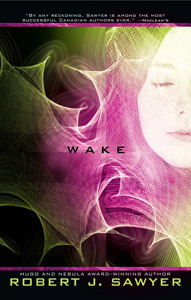
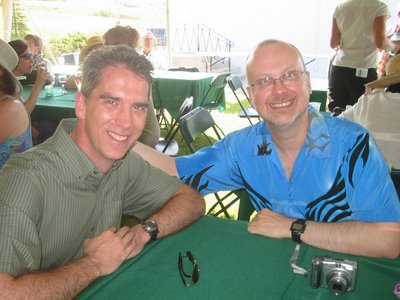
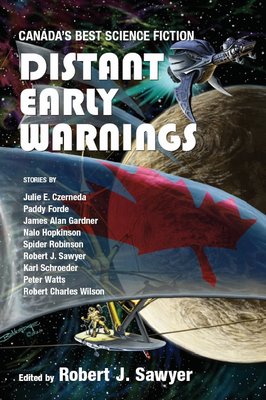
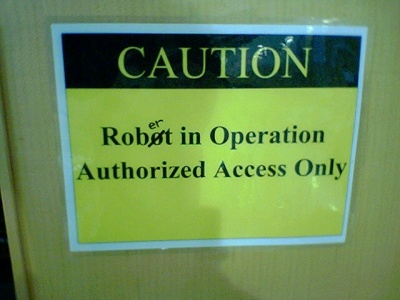
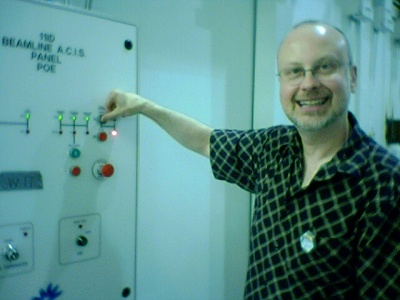
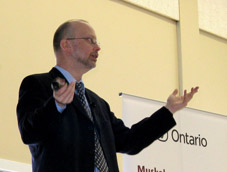

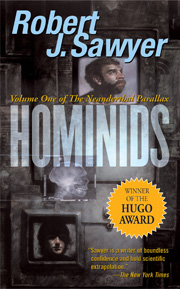
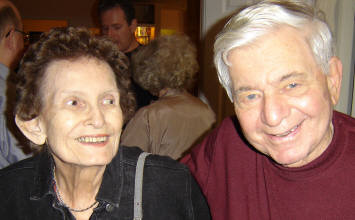
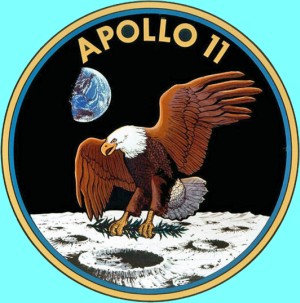

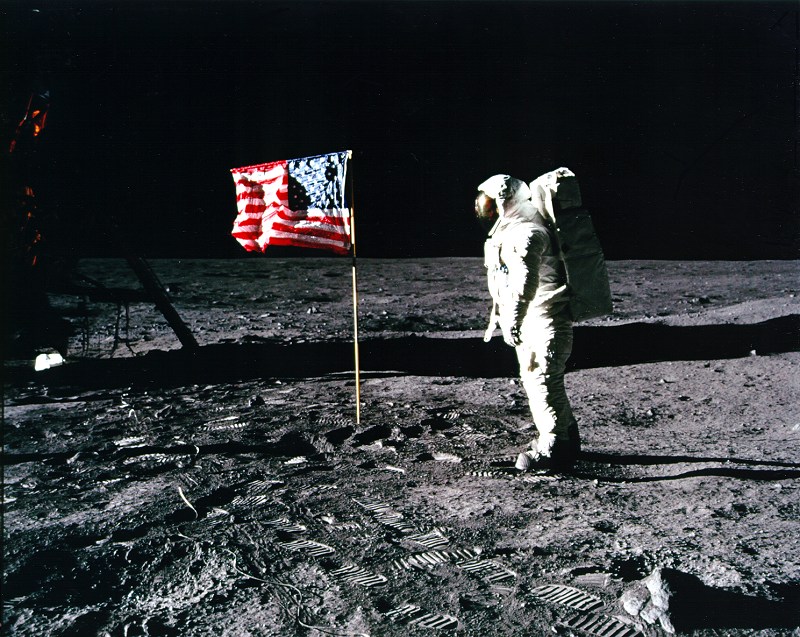



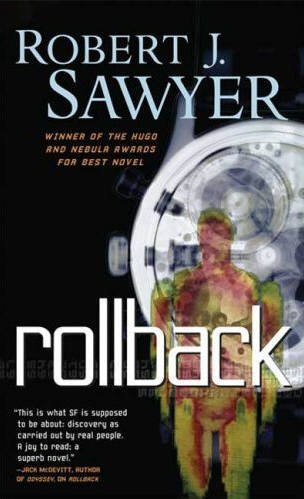
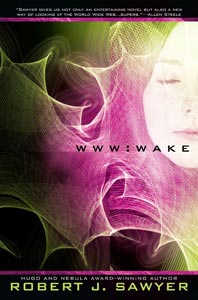
![[Wake Press Release]](http://sfwriter.com/wake-press-release.jpg)


